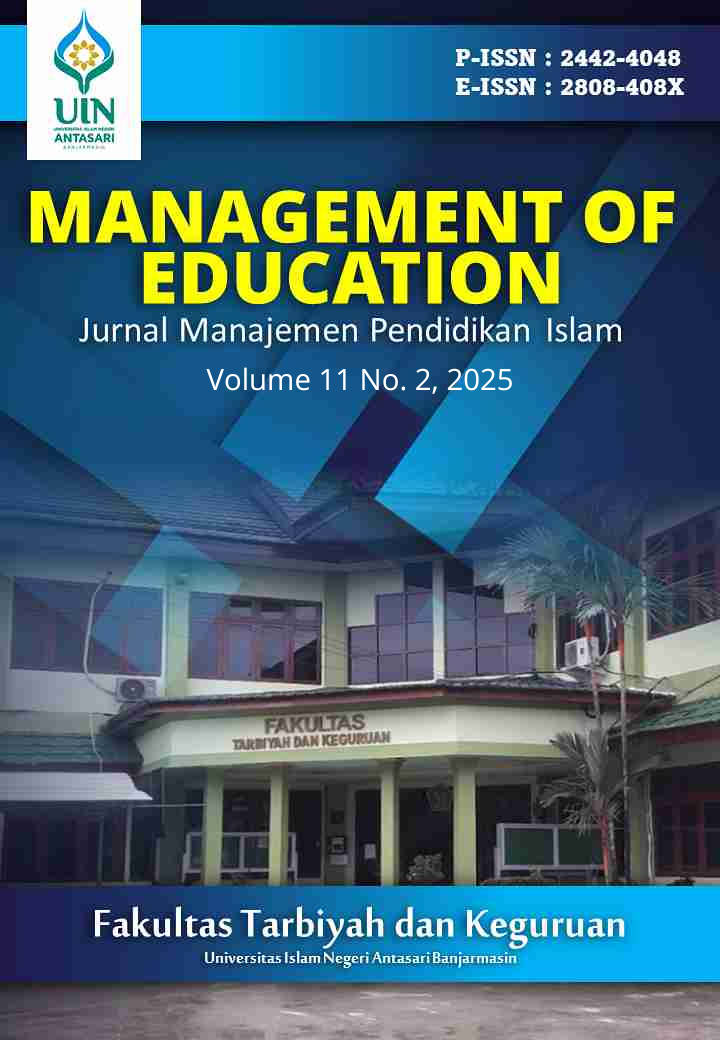Character and Values Education in the Türkiye Century Maarif Model: A Qualitative Document Analysis
DOI:
https://doi.org/10.18592/moe.v11i2.18337Keywords:
Character Education; Curriculum Reform; Türkiye; Primary Education; Moral Values; QualitativeAbstract
This study critically analyzes how moral and civic values are represented and operationalized within the Türkiye Century Maarif Model (TYMM) for primary education through a qualitative document analysis approach. Using Braun and Clarke’s six-phase thematic framework, five official curriculum and policy documents published by the Ministry of National Education between 2023 and 2024 totaling approximately 450 pages were examined. The analysis identified four structural themes: Virtue (Erdem), Value (Değer), Action (Eylem), and Pedagogical Reflection, each illustrating how the TYMM transforms moral education from implicit moral instruction into an explicit, measurable, and pedagogically integrated framework. The findings reveal that the TYMM links personal morality with civic responsibility, embedding values such as honesty, justice, empathy, and cooperation within competency-based learning outcomes. While the model successfully harmonizes local moral heritage with global citizenship principles, it also reveals ideological tensions between universal ethics and national identity. Theoretically, this study contributes to moral and character education literature by offering a curriculum-level perspective on how values are linguistically structured and pedagogically operationalized. Practically, it provides a conceptual reference for educators and policymakers seeking to align moral formation with democratic and global educational goals.References
Aktepe, V., Keser, H., & Şeref, Ş. E. (2020). Sınıf öğretmenlerinin perspektifinden değerler eğitimi uygulamalarının değerlendirilmesi. Afyon Kocatepe Üniversitesi Sosyal Bilimler Dergisi, 22(4), 897–918. https://doi.org/10.32709/akusosbil.781857
Arthur, J. (Ed.). (2019). Virtues in the public sphere. Oxon: Routledge.
Bayat, S., & Yazar, T. (2022). Sınıf öğretmenlerine yönelik değerler eğitimi öz yeterlik ölçeği geliştirme çalışması. Eğitimde Kuram ve Uygulama, 18(1), 30–45. https://doi.org/10.17679/inuefd.1163397
Bowen, G. A. (2009). Document analysis as a qualitative research method. Qualitative Research Journal, 9(2), 27–40. https://doi.org/10.3316/QRJ0902027
Braun, V., & Clarke, V. (2006). Using thematic analysis in psychology. Qualitative Research in Psychology, 3(2), 77–101. https://doi.org/10.1191/1478088706qp063oa
Fullan, M. (2007). Leading in a culture of change. John Wiley & Sons.
Halstead, M., & Taylor, M. J. (2005). Values in education and education in values. Routledge.
Lee, I.-J. (2001). The proper directions and practical ways for character education in the Korean elementary school. Asia Pacific Education Review, 2, 72–84. https://doi.org/10.1007/BF03026292
Lickona, T. (1992). Educating for character: How our schools can teach respect and responsibility (Updated ed.). Bantam Books. ISBN 9780553370522
Millî Eğitim Bakanlığı (MEB). (2023). Sosyal Bilgiler Dersi Öğretim Programı (4–7. Sınıflar). Talim ve Terbiye Kurulu Başkanlığı. https://mufredat.meb.gov.tr
Millî Eğitim Bakanlığı (MEB). (2024a). Türkiye Yüzyılı Maarif Modeli Ortak Metni. Talim ve Terbiye Kurulu Başkanlığı. https://mufredat.meb.gov.tr
Millî Eğitim Bakanlığı (MEB). (2024b). Erdem–Değer–Eylem (EDE) Çerçevesi. Talim ve Terbiye Kurulu Başkanlığı. https://mufredat.meb.gov.tr
Millî Eğitim Bakanlığı (MEB). (2024c). Türkçe Dersi Öğretim Programı (1–8. Sınıflar). Talim ve Terbiye Kurulu Başkanlığı. https://mufredat.meb.gov.tr
Narvaez, D., & Bradshaw, G. A. (2023). The evolved nest: Nature's way of raising children and creating connected communities. North Atlantic Books.
Nucci, L., Krettenauer, T., & Thompson, W.C. (Eds.). (2024). Handbook of moral and character education (3rd ed.). Routledge. https://doi.org/10.4324/9781003374077
OECD. (2019). OECD learning compass 2030: A series of concept notes. OECD Publishing.
Thornberg, R., & Oğuz, E. (2013). Teachers’ views on values education: A qualitative study in Sweden and Turkey. International Journal of Educational Research, 59, 49–56. https://doi.org/10.1016/j.ijer.2013.03.005
Tirri, K. (2011). Holistic school pedagogy and values: Finnish teachers’ and students’ perspectives. International Journal of Educational Research, 50(3), 159-165. https://doi.org/10.1016/j.ijer.2011.07.010
UNESCO. (2023). Reimagining our futures together: A new social contract for education. UNESCO Publishing. https://unesdoc.unesco.org/ark:/48223/pf0000379707
Veugelers, W., & Bosio, E. (2023). Linking moral and social-political perspectives in global citizenship education: A conversation with Wiel Veugelers. Prospects, 53(3), 181-194. https://doi.org/10.1007/s11125-021-09576-4
Downloads
Published
How to Cite
Issue
Section
License
Copyright (c) 2025 Ethem Gürhan

This work is licensed under a Creative Commons Attribution 4.0 International License.
Authors who publish with this journal agree to the following terms:
- Authors retain copyright and grant the journal right of first publication with the work simultaneously licensed under a Creative Commons Attribution 4.0 International that allows others to share the work with an acknowledgement of the work's authorship and initial publication in this journal.
- Authors are able to enter into separate, additional contractual arrangements for the non-exclusive distribution of the journal's published version of the work (e.g., post it to an institutional repository or publish it in a book), with an acknowledgement of its initial publication in this journal.
- Authors are permitted and encouraged to post their work online (e.g., in institutional repositories or on their website) prior to and during the submission process, as it can lead to productive exchanges, as well as earlier and greater citation of published work.









 This work is licensed under a
This work is licensed under a 